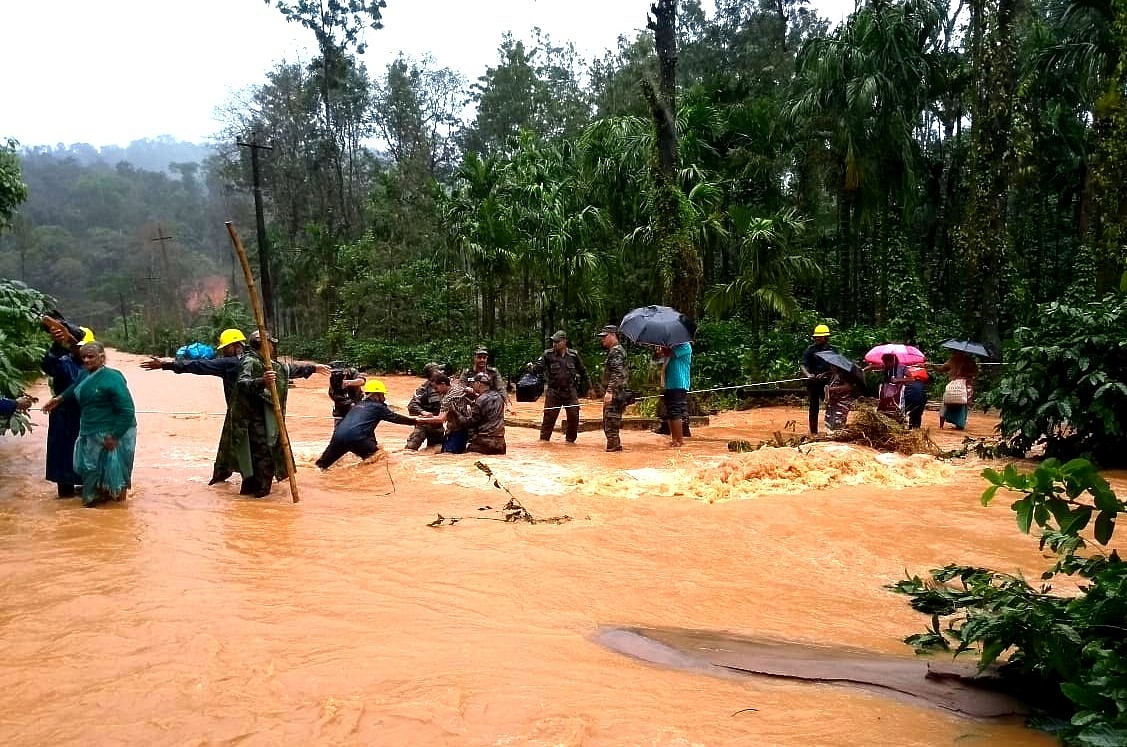News Brief
Deforestation In Western Ghats Caused Floods In Karnataka, Kerala
- The results of the study indicate that the future trends of deforestation would induce higher instances of flooding and drought due to changes in the climate.

Army rescuing people in Kodugu, Karnataka (@adgpi/Twitter)
The delayed monsoon this year was followed by unexpected flooding that wreaked havoc on the lives of people across Karnataka and Kerala, leaving villages completely inundated, crops and livestock destroyed and rendering thousands of people homeless.
As per a recent study report, this flooding was not natural but a man-made disaster, probably the direct result of deforestation in the Western Ghats.
According to researchers at the Indian Institute of Science (IISc), there is a direct relationship between the deforestation of the Western Ghats and the floods that the two states experienced this year.
The study titled, ‘Carbon Sequestration Potential of the Forest Ecosystems in the Western Ghats: a Global Biodiversity Hotspot’ states that forest degradation and the resulting improper carbon sequestration are likely responsible for the recent floods in the region.
Carbon sequestration is a natural or artificial process by which carbon dioxide is removed from the atmosphere and held in solid or liquid form in the soil and plant forms.
The Western Ghats is one among 36 global biodiversity hotspots where the forests in the region act as carbon sinks sequestering atmospheric carbon. Such sequestering of atmospheric carbon aids in moderating the climate and sustaining water to ensure water and food security in peninsular India.
Human activities such as burning fossil fuel, power generation, agriculture, industry, polluting water bodies and urban activities are responsible for increasing the greenhouse gas footprint of which 72 per cent constitute carbon dioxide.
Large-scale land-cover changes have lead to deforestation and land degradation. This contributes to 20–25 per cent of human-related carbon emissions, which has affected the region’s climate patterns.
The paper — authored by Dr T V Ramachandra from the Centre for Ecological Studies, IISc and Setturu Bharath from the Centre for Sustainable Technologies — also reveals that there has been a decline in evergreen forests by 5 per cent due to a rise in agriculture, plantations and built-up area.
Their study confirms that the forests of the Western Ghats are incredible reservoirs of biomass and carbon stock. This highlights the decisive role of forests in lowering atmospheric carbon — which is emitted due to human-related activities — and in mitigating global warming.
Their analysis indicates that the regions in southern Western Ghats of Kerala and part of Karnataka have witnessed large-scale climate changes.
Reduction in the natural forests has reduced the surface roughness and aerodynamics. Rain bearing clouds, therefore, move along with the winds, causing rainfall to occur in the windward direction.
Consequently, we have experienced in this monsoon season increased rainfall and rainy days in the northern Western Ghat regions and decreased rainfall and rainy days in the southern Western Ghat regions.
Meaning, there has been a reduction in rainy days (4 days) in Kerala and Tamil Nadu parts of the Western Ghats with an increase in the Maharashtra regions. The results of the study indicate that the future trends of deforestation would induce higher instances of flooding and drought due to changes in the climate.
The New Indian Express quotes Dr T V Ramachandra as saying that the quantity of rain which should occur for a month’s duration is happening in just a week-and-a-half, thus leading to flooding.
According to the study, deforestation has also contributed to an increase in mean temperature by 0.5°C in the southern Western Ghats region. This has lead to a decline in rainy days.
Knowing this necessitates that we evolve prudent landscape management strategies that involve all stakeholders to conserve our ecologically fragile Western Ghats. This will enhance the ability of the Western Ghat forests to sequester atmospheric carbon and moderate the climate thereby sustaining our ecosystem.
According to the study, India accounts for 7 per cent of total greenhouse gas emissions across the globe and stands fourth after major carbon emitters like China (27 per cent ), United States of America (15 per cent) and the European Union (10 per cent).
Support Swarajya's 50 Ground Reports Project & Sponsor A Story
Every general election Swarajya does a 50 ground reports project.
Aimed only at serious readers and those who appreciate the nuances of political undercurrents, the project provides a sense of India's electoral landscape. As you know, these reports are produced after considerable investment of travel, time and effort on the ground.
This time too we've kicked off the project in style and have covered over 30 constituencies already. If you're someone who appreciates such work and have enjoyed our coverage please consider sponsoring a ground report for just Rs 2999 to Rs 19,999 - it goes a long way in helping us produce more quality reportage.
You can also back this project by becoming a subscriber for as little as Rs 999 - so do click on this links and choose a plan that suits you and back us.
Click below to contribute.
Latest